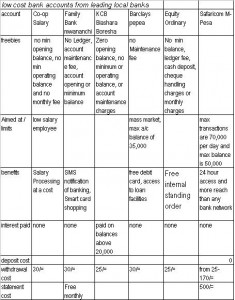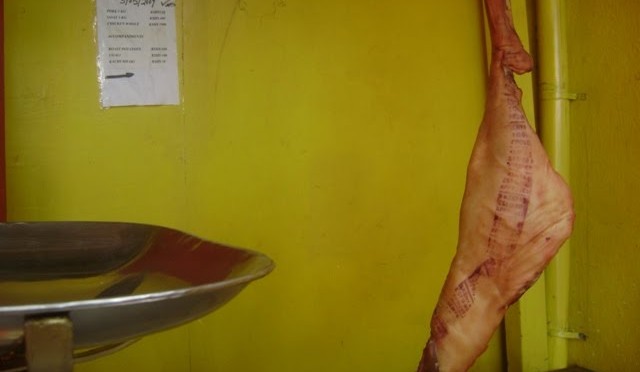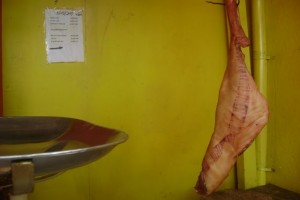excerpts from the last ½ of the meeting
Q&A leading into the 2009 AGM, Olympia shareholders had many questions revolving around the companies investment strategy, governance issues, disastrous foray into South Africa and prospects of escaping an Uchumi like future as the AGM was postponed, and happened a week later than scheduled.
Governance: – the AGM was delayed, the Board said, because the annual accounts were late coming out; one shareholder urged them to do better, not aim for the minimum corporate of 21 days only to avoid being late and incurring regulator penalties. CEO (Michael Matu) said they had noted this and had improved to the extent that the ½ year accounts were released in September, just over month after completion of period.
(lacking) corporate governance (missed this part where the auditor read out a statement that the company had no corporate governance in place. The auditor apparently made a similar remark last AGM, but that was omitted from the minutes of the meeting presented today – the directors mentioned they have engaged consultants and were embarking on corporate governance measures. One shareholder noted that the board had promised the same last year and no piece meal measures have been implemented to which the directors said they were doing this now and would brief shareholder in about two months
director loans increasing each year amount to 18.3 million – who, for what, what terms? CEO said he’s the only director and he has borrowed to buy house and car. Loan interest is paid and assets are charged to the company
insider board: One shareholder complained that 5 of the 7 directors had links to the parent company, so board was not truly independent
investor briefing -one shareholder presented the directors with a list of 35 detailed questions. The chairman suggested they have an investor briefing in about two months where all these and other shareholder questions can be exhaustively answered it will not be an EGM. CEO also promised to reply to all these questions via e-mail to the shareholder and copy his replies to the Capital Markets Authority whose representatives were in attendance
– at that time, the directors all also explain what measures they have taken in the area of corporate governance
Strategy Going Forward – For SADC (southern Africa) Olympia is still keen on the building materials market which is still strong. Even plan to go back into South Africa but without a link to Builders Warehouse – who handled 75% of their sales. They hope to revive and relocate the Natwood business to Botswana (Gaborone) from South Africa from where it will be easier and cheaper to supply their core markets in the Gauteng region (transport distances will halve from 600km to 300km)
– now going into Zambia on a smaller scale, and will look at Zimbabwe since economy is more attractive after dollarization
– part of problem was they did not make the management changes that they hoped to make; hire right people
Investments – Dunlop is profitable this half year, though had not yet installed new plant they bought to replace their exiting 1970’s plant. However with what they know from the Botswana tiles operation, they know how they can multiply their products & sales in Kenya with Dunlop once new plant is installed. From Botswana they supply South Africa, Zimbabwe, Angola Nigeria and Mozambique. Answering a separate shareholder question, mentioned that factory land had been given to Dunlop to support their balance sheet, but transfer had not been effected since they were awaiting confirmation that there would be no stamp duty to be paid on deal
– Mather & Platt, they bought out centum’s shareholding, but are yet to beef up the management there
– A shareholder (who was transaction adviser on the rights issue of 2007) said he was surprised to see how share transfers were disclosed in 2009 accounts. CEO said that at the time of rights issue, shares were allocated pending investments later made. E.g. Olympia had no cash to take up Heri rights issue, but Avon advanced Olympia cash against balance sheet . In answering a similar question CEO said of their strategy – when they see opportunities, but have no cash they arrange for third party to buy shares and agree to re-sell them to Olympia at later date
– No due diligence in describing Natwood investment, CEO had mentioned that they paid ½ the funds but later their due diligence showed that there were come issues within the company and a shareholder questioned if any initial due diligence was done at all. CEO explained that if company went after blue chip companies, they would pay premium prices, but they chose to go after viable but distressed companies and in this case they had consulted advisers and lawyers before natwood deal.
Shareholder votes – One director was re-elected, but COO Mwangi Wamae opted out of re-election to the board.
– ESOP though directors said employee share options plan (ESOP) will be a key tool to attract top managers for the various companies, shareholders voiced concern that this was the wrong time to bring up an ESOP, with the board governance not in place. Directors argue that the ESOP approval was separate from the implementation noting that – they have had an ESOP in Botswana for 3 years with no shares issued, and that the CMA (Kenya) would not be discuss and approve an ESOP unless shareholders had approved it. Since this was a formality it was approved.
– A dividend of 10 cents was approved. Chairman joked that this was the same as Safaricom was paying
Summary: Olympia CEO and Board pulled it off (again) – reassuring shareholders that the company was sound, strategy & governance would improve, they had a plan to take it forward and that the worst (of the SA foray) was behind them now.





